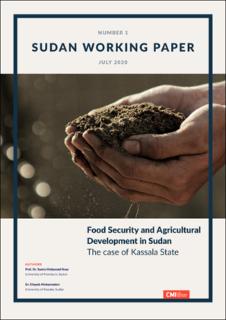Food Security and Agricultural Development in Sudan: The case of Kassala State
Working paper
Permanent lenke
https://hdl.handle.net/11250/2669812Utgivelsesdato
2020-07-01Metadata
Vis full innførselSamlinger
- Publications [1488]
Originalversjon
Bergen: Chr. Michelsen Institute (Sudan Working Paper SWP 2020:1)Sammendrag
This research discusses the relationship between agricultural development and food security, determinants of supply of (production of food) and demand for (consumption of food) food and determinants of food insecurity in Kassala State. In so doing, it provides a significant contribution to the current literature. We use the measurement of household food insecurity access scale and use new primary data from a Food Security Household Survey conducted in Kassala State (2019). We find that the majority of households are food insecure (77%), out of which 32.9% of households are severely food insecure, while, few households are fully food secure (23%). We find large variation in households' food insecurity between localities, with rural Kassala having most food insecure households. This may be explained by the variation in monthly income between localities. We use OLS estimation to estimate the determinants of household level production and consumption of food. We verify our first hypothesis that the significant determinants of production of food are the size of agricultural land, livestock and irrigation systems. We find support for our second hypothesis that indicates that the family's own production of food and household income have positive effects on food consumption. Similarly, we find that the significant determinants of production of sorghum (the main staple food) are agricultural land and livestock and that the significant determinants of consumption of sorghum are the family's own production of sorghum, household income and family size. For small farmers, their own consumption of sorghum is to a larger extent determined by their own production of sorghum. Therefore, enhancing production of sorghum among smallholders would contribute to enhancing consumption of sorghum and hence food security. Using ordered probit (and logit) estimation we verify our third hypothesis that implies that the significant determinants of household food insecurity score index are fami
Utgiver
Chr. Michelsen InstituteSerie
Sudan Working Paper SWP 2020:1Sudan Working Paper SWP 2020:1
Sudan Working Paper SWP 2020:1
Sudan Working Paper SWP 2020:1
Sudan Working Paper SWP 2020:1
Sudan Working Paper SWP 2020:1
Sudan Working Paper SWP 2020:1
Sudan Working Paper SWP 2020:1
